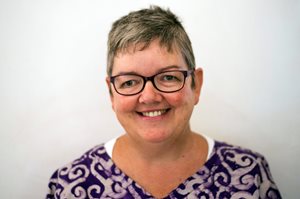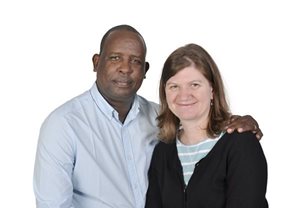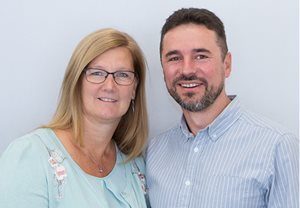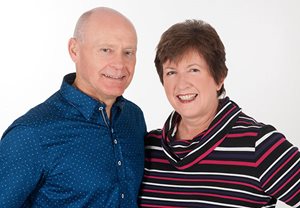Rev Uel Marrs, Secretary to PCI’s Council for Global Mission says that it has been a busy time for the remaining staff in the Mission Department as they continue to support the denomination’s 27 global mission workers.
“When we are focused on our own families and local communities, and the affect that COVID-19 is having on us, it easy to forget that we are living through a pandemic that is affecting the lives of billions of people across the planet. This includes, of course, those who have gone overseas as part of our Church’s longstanding commitment to be global disciples, sharing God’s heart for the world, declaring the good news of Jesus Christ, and demonstrating God’s love.” he said.
“Through partnership links with indigenous churches, Christian institutions and international mission agencies in more than 20 countries, PCI directly supports global mission workers in 11 countries on 4 continents. Each has a clear outreach focus, and to varying degrees, the pandemic has affected each of their countries and their ability to work, which they have shared in their monthly bulletins on the PCI website.”
 Diane Cusick has been the early childhood development co-ordinator with the Church of Central Africa Presbyterian’s Synod of Zambia, since May 2016, although her overseas service began in Malawi in 1995. Writing from Lusaka she says, “In Zambia, life is all about ‘Ubuntu’, the spirit of togetherness, doing things in community, working as one. For the past four weeks we have been told to self-isolate, to practice social distancing, have no mass gatherings (no church, weddings or funerals), to wear face masks which is mandatory, to wash hands with soap and water or use hand sanitiser and to stay home and work from home if you can…
Diane Cusick has been the early childhood development co-ordinator with the Church of Central Africa Presbyterian’s Synod of Zambia, since May 2016, although her overseas service began in Malawi in 1995. Writing from Lusaka she says, “In Zambia, life is all about ‘Ubuntu’, the spirit of togetherness, doing things in community, working as one. For the past four weeks we have been told to self-isolate, to practice social distancing, have no mass gatherings (no church, weddings or funerals), to wear face masks which is mandatory, to wash hands with soap and water or use hand sanitiser and to stay home and work from home if you can…
Social distancing when collecting water is non-existent
“I am blessed. I have a nice place to stay. I can walk each day at sunrise when fewer people are around. I have food, soap and water. I can connect to friends and family and join in many church services through social media. Many friends and colleagues are not in this same position. No work means no money and no food or soap, never mind a face mask. No church means no money and no income for our pastors. Water is a scarce commodity in some areas of Zambia, even in the compounds in Lusaka. Many people share a borehole or tap as there is no running water. Social distancing when collecting water is non-existent.”
You can read more from Diane in her blog 'Far from home in a global lockdown'.
Over 1,400 mi les to the north east in Kenya, Naomi Leramore writes of ‘scary times’ and for a while wondered if she and her husband Thomas, and two sons should, as Naomi put it, ‘stay or go’. Naomi has been serving in Kenya since 1998 with the Presbyterian Church of East Africa, most recently with their Theological Education by Extension department in the capital, Nairobi.
les to the north east in Kenya, Naomi Leramore writes of ‘scary times’ and for a while wondered if she and her husband Thomas, and two sons should, as Naomi put it, ‘stay or go’. Naomi has been serving in Kenya since 1998 with the Presbyterian Church of East Africa, most recently with their Theological Education by Extension department in the capital, Nairobi.
“The thought of self-isolating in Nairobi indefinitely was claustrophobic. So, while I went shopping for essential supplies, Thomas headed upcountry in search of a temporary place for us to quarantine in.” ‘Upcountry’ refers to anywhere in rural Kenya.
Several days later he found a place to the north of the capital. “It’s Thomas’ home turf which has additional benefits. Our landlady, who lives in the compound opposite, is a relative and her children have become friends with our boys,” Naomi reports.
“We hope to start a vegetable patch soon and pass on some blessings to the next tenant after we leave. At this stage, we don’t know how long we’ll be staying, it depends on when life goes back to a more normal routine.”
 Closer to home in Europe, Csaba and Ilona Veres have been serving as a global mission workers in Romania since the 1990s. Based in Cluj, in the northwest, they both serve in the Diakonia, the Hungarian Reformed Church’s social action ministry in Transylvania. Diakonia has been helping communities across the region through education, healthcare, community development and Bible teaching for nearly 20 years.
Closer to home in Europe, Csaba and Ilona Veres have been serving as a global mission workers in Romania since the 1990s. Based in Cluj, in the northwest, they both serve in the Diakonia, the Hungarian Reformed Church’s social action ministry in Transylvania. Diakonia has been helping communities across the region through education, healthcare, community development and Bible teaching for nearly 20 years.
Creating space before the influx
The Veres write, “The Diakonia children’s ministries have been cancelled throughout Romania due to the Coronavirus and we are presently working from home on administration...” They also write that Diakonia’s team of nurses in Cluj, which they support, continue to work in the community, caring for those suffering from life-threatening illnesses.
Sterilising facemasks daily, so that they can be re-used in order to prolong the supply, the nurses are currently supporting patients sent home from hospital in order for the authorities to create space for the influx of coronavirus patients.
 In Spain, Derek and Jane French say that from early March, things have been “a blur of school at home, skype calls, zoom meetings [and] WhatsApp’s…” Based in Bilbao in northern Spain, they have been serving since 2007 with Grupos Bíblicos Unídos, a Christian student organisation. Their first church service, via the Zoom video conferencing platform, was on 22 March, which they described as “encouraging, sobering and [a] comforting time together, drawing from God and his strength.” The restrictions and lockdown in Spain have been very restrictive, with only Derek being able to leave their apartment to buy groceries.
In Spain, Derek and Jane French say that from early March, things have been “a blur of school at home, skype calls, zoom meetings [and] WhatsApp’s…” Based in Bilbao in northern Spain, they have been serving since 2007 with Grupos Bíblicos Unídos, a Christian student organisation. Their first church service, via the Zoom video conferencing platform, was on 22 March, which they described as “encouraging, sobering and [a] comforting time together, drawing from God and his strength.” The restrictions and lockdown in Spain have been very restrictive, with only Derek being able to leave their apartment to buy groceries.
Self-isolation is difficult in poor communities
Across the Atlantic, PCI’s Naomi Keefe works alongside a congregation of the Presbyterian Church of Brazil in church-based and Bible-based community development and outreach activity.
“At the moment I am following the State´s recommendations to stay at home. The activities of the congregations, Sunday services, and the evangelistic activities in the communities have been cancelled indefinitely…” she writes. All schools together with universities have been closed along with all shops, except for supermarkets and bread shops,” Naomi explained.
“Implementing Isolation is difficult in the poor communities as people live literally on top of one another. Families of six plus, living in small houses/shacks is difficult when everyone is recommended to stay inside…The majority of children from the Good News Club normally get a free main meal at school but as there are no school activities weekly food baskets and cleaning materials are being handed out to the families.”
 Economic devastation
Economic devastation
In another part of the world, Peter and Jayne Fleming, have been serving with the United Mission to Nepal since 2017. “At the beginning of April there were only 6 confirmed cases of Covid-19 and no deaths. These figures have begun multiplying and no one knows where it will end.
"What we do know is that there are some huge trials ahead. Even if the disease does not take hold and kill many thousands, a damaging wave of poverty is about to sweep the country. The economic impact will dramatically change life for millions…Last year Nepal tourism was worth £1.6 billion and provided work for over a million Nepalis. That has now finished. Many other businesses in Nepal are closing. A huge number of Nepalis are ‘daily wage earners’ – if they get work that day they will be paid, otherwise they receive nothing. The result is going to be grinding poverty for large numbers – even without disease and death.”
Peter also writes that for many years thousands of Nepali overseas workers have been supporting families at home. In 2018 the amount sent back home was £8.1 billion, or 28% of the national GDP. That will now end as jobs close and many have returned home.
Rev Uel Marrs concluded by saying, “As disciples of Jesus Christ we are called to be a blessing to others, not just at home in Ireland, but overseas as well. PCI has a long tradition of overseas mission and in these difficult times we give thanks to God for our global mission workers, remembering them in our prayers as we also pray for PCI’s partners in mission, and the affect COVID-19 is having on them and their people.”
You can find out more about all PCI’s global mission workers, and read their monthly bulletins here.
Each year the Moderator undertakes an overseas tour, often to countries where PCI global mission workers serve. You can read about some of those visits to the countries mentioned in this news story here. This year Dr William Henry visited Kenya, in 2017 Dr Noble McNeely went to Zambia, and in 2016 Dr Frank Sellar visited Nepal, a year after a devastating earthquake hit the country. The previous year Dr Ian McNie had travelled to Malawi, while Kenya was the destination for Dr Michael Barry in 2014.